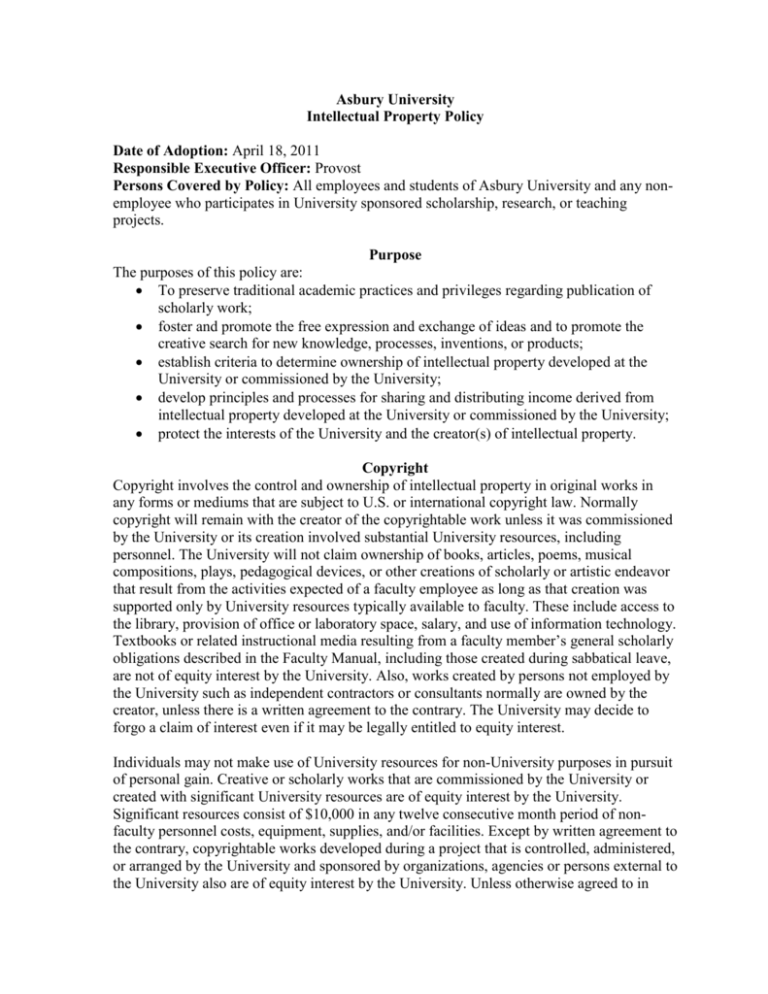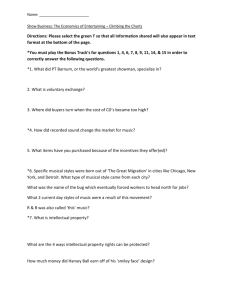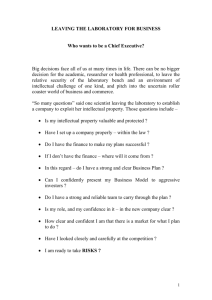
Asbury University
Intellectual Property Policy
Date of Adoption: April 18, 2011
Responsible Executive Officer: Provost
Persons Covered by Policy: All employees and students of Asbury University and any nonemployee who participates in University sponsored scholarship, research, or teaching
projects.
Purpose
The purposes of this policy are:
To preserve traditional academic practices and privileges regarding publication of
scholarly work;
foster and promote the free expression and exchange of ideas and to promote the
creative search for new knowledge, processes, inventions, or products;
establish criteria to determine ownership of intellectual property developed at the
University or commissioned by the University;
develop principles and processes for sharing and distributing income derived from
intellectual property developed at the University or commissioned by the University;
protect the interests of the University and the creator(s) of intellectual property.
Copyright
Copyright involves the control and ownership of intellectual property in original works in
any forms or mediums that are subject to U.S. or international copyright law. Normally
copyright will remain with the creator of the copyrightable work unless it was commissioned
by the University or its creation involved substantial University resources, including
personnel. The University will not claim ownership of books, articles, poems, musical
compositions, plays, pedagogical devices, or other creations of scholarly or artistic endeavor
that result from the activities expected of a faculty employee as long as that creation was
supported only by University resources typically available to faculty. These include access to
the library, provision of office or laboratory space, salary, and use of information technology.
Textbooks or related instructional media resulting from a faculty member’s general scholarly
obligations described in the Faculty Manual, including those created during sabbatical leave,
are not of equity interest by the University. Also, works created by persons not employed by
the University such as independent contractors or consultants normally are owned by the
creator, unless there is a written agreement to the contrary. The University may decide to
forgo a claim of interest even if it may be legally entitled to equity interest.
Individuals may not make use of University resources for non-University purposes in pursuit
of personal gain. Creative or scholarly works that are commissioned by the University or
created with significant University resources are of equity interest by the University.
Significant resources consist of $10,000 in any twelve consecutive month period of nonfaculty personnel costs, equipment, supplies, and/or facilities. Except by written agreement to
the contrary, copyrightable works developed during a project that is controlled, administered,
or arranged by the University and sponsored by organizations, agencies or persons external to
the University also are of equity interest by the University. Unless otherwise agreed to in
writing, royalties or other payments received by the University under any claim of equity
interest shall be distributed in accordance with the Royalty and Licensing Policy described
below. This includes income from courses or course components created for distance
learning or distributed learning activities, including on-line coursework.
Faculty members who create distance learning materials, including on-line coursework,
without the aid of University resources retain copyright. If the creation of such materials or
courseware resulted from a contract with the University and involved University resources,
as defined above, the University will own copyright. Both the University and the creator will
own a non-exclusive “right to use” license for educational purposes, even if the creator
leaves the University. Unless otherwise agreed to in writing, the creator may not offer these
materials to others, including other employers, and may not offer them for commercial use.
Courses and course materials such as lectures, labs, and class activities that are recorded
using any form of media are University property and may not be distributed without
University permission. This excludes evanescent recording and distribution to students for
educational purposes (which is always permitted) or for other approved University purposes.
If the University retains and/or markets such recordings for later on- or off-campus
instructional use, consent of the creator must first be obtained.
The University retains the right to use recordings of on-campus performances by its students
and employees for educational, archival, promotional, or commercial purposes. If the
University records such performances in any form of media for commercial purposes,
permission of the performers shall first be obtained. Royalties or other revenues received by
commercialization will be distributed in accordance with the Royalty and Licensing Policy
described below on a pro-rata basis to all performers unless otherwise specified in a preperformance contract.
To protect copyright, the following notice should appear on all University-owned materials:
Copyright © {year} Asbury University. All Rights Reserved. No part of this work may be
reproduced or transmitted in any form or by any means without the prior written permission
of Asbury University, unless such copying or transmittal is expressly permitted by federal or
international copyright law. Address inquiries to: Copyright Permission, Provost, Asbury
University, One Macklem Drive, Wilmore, KY 40390. The date listed should be the year
when the work was first produced or published.
Intellectual Property
In addition to anything that is copyrightable, intellectual property includes any issued patent,
or legal right inhering in a patent, or any potentially patentable invention, device, process,
product (including databases), or improvement in biological, chemical, or mineral materials.
Included also are trade or service marks, logos, or distinctive symbols identifying the
University or associated with goods or services distributed by the University.
The University shall seek effective means of transferring for public benefit and use
University-owned intellectual property, including that with commercial value or potential.
Toward this end the University may negotiate exclusive or non-exclusive licensing
agreements with outside entities. Such licenses must be approved by the Provost’s Office
before they are executed. Grants or contracts frequently involve arrangements for shared
intellectual property rights. Such arrangements must be approved by the President prior to the
award of any grant or contract that limits intellectual property rights of the University, its
employees, or its students.
Royalty and Licensing Policy
Following recovery of any costs associated with commercialization of University-owned
intellectual property, including but not limited to attorney’s fees, patent filing fees, and
marketing costs, the net revenue generated from royalties, licensing fees or other revenue
sources will be distributed as follows: 50% to creator(s) or inventor(s); 40% to the
University; 10% to the creator(s) or inventor(s) Department(s) except as otherwise agreed to
by contract, governing law, or regulations.












